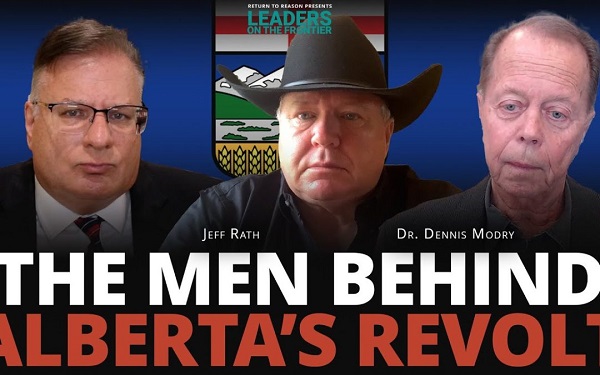Baçk to Power Struggle: “Investors right now will know that Canada has all of this latent potential, they will know that there are resources there, they will know that there are talented workers in Canada. But (they need) the answers to what barriers there are to business and how they can be reduced, and I think that’s the piece that Canada and its provinces can do a better job on. “That’s the thing that I think Canada would benefit from, showing how it is a kind of a more unified country and showing how that it is a unified marketplace where investors and businesses can develop expansive supply chains.”
In the National Post: “A country with its geography could clearly generate higher output. To do so, the Canadian economy needs to become more efficient, raise investment and attract more high-skilled workers. Here’s how. “Canada places significant bureaucratic burdens on the movement of people and goods too. This includes restrictions on the sale of certain goods across provincial borders, and variations in licences and technical standards that hinder scaling, competition and efficient resource allocation across the country.
“A 2022 study by the Macdonald-Laurier Institute found that Canada’s economy could grow by 4.4 to 7.9 per cent in the long term — up to $200 billion a year — if it eliminated internal trade barriers via mutual recognition policies. Similar reforms in Australia in the 1990s helped to boost productivity there. “Simplifying its complex tax system, expediting planning processes, easing red tape for foreign direct investment and developing economic partnership mechanisms for Indigenous populations, in tandem with internal trade reforms, would help businesses across the industrial supply chain tap into the nation’s vast energy and mineral resources.”
On Power Struggle: “You can be rich in oil and natural gas. But obviously over the last 10, 15 years the global economy has been thinking about alternatives. In Europe and in the UK and in some states in the US, there’s a concerted effort to shift to cleaner energy sources. Canada has vast access to the critical minerals that underpin a lot of renewable energy sources. And then you can go further than that. “This isn’t just about having access to those, you know, old world energy sources. This is access to the type of energy sources that the world is looking for. So Canada is aligned to the renewable transition and I was quite surprised, actually, that in the last 10 to 15 years you haven’t really heard Canada’s name in that. I thought it was about time that Canada plays that up a bit more and the opportunities it has there.”
Tej Parikh continued: “This isn’t about just digging up Canada and exploiting its raw materials. It’s about finding ways in which you can create economic compacts with Indigenous communities, create economic compacts with Indigenous communities. “It’s a way in which you can sustainably mine parts of the country and ensure that, as you are developing underground resources in Canada, you are also developing local economies. Developing an industry means you develop jobs.
“Once you start developing factories and industries in certain areas, then financial services, commercial roles, all of these things build up, and that’s how I think the debate needs to be kind of pushed forward a little bit. “Once you start developing finance around these industries, you can also find ways to make these industries even more sustainable and environmentally friendly.”
“I think there are very clever ways in which Canada and all Canadians can see that actually these natural resources that the country has is actually an asset that everyone has a share in.” Stewart Muir then raised the Donald Trump issue: “Where have you landed on what Trump is all about? I mean, is this a poker game? Is it a chess match? Is it a street fight?”
Tej Parikh: “He likes negotiating and I think, from what we can understand from his tariff policy, he takes things to extremes and then he rows things back and he tries to gain concessions where he can. And I think he will take the same approach on most policy he has. I mean, he sees the world through a transactional lens. It’s ‘what can the other people offer me and how can we do a deal to ensure that I can gain that?’ “And I think in some sense, you know, yes, he is unpredictable, above and beyond that. But I think if you know that that's his framing, then I think it means that you know others just need to adjust to it and be pragmatic in it. And that is essentially what we have seen from the way the Canadian prime minister has been interacting with Donald Trump. You have to be pragmatic if you know what the threat could be.”
Parikh added: “I think the first thing is (Prime Minister Mark Carney) should build on the momentum that he has, the political momentum he has on reducing internal trade barriers in Canada. You then create the groundwork in order to start taking advantage of the mineral resources and the natural resources.” “Once Canadians start to feel that everyone is benefiting from the natural resources in the country and there are avenues to recycle the revenues from those sectors into the country, whether that’s through housing or developing infrastructure, improving public services, you then have this kind of reinforcement effect between the country and its natural resources and its assets and the development of peoples, and I think working on that will kind of provide the groundwork for Canada’s emergence.”
In the National Post: “The Canadian economy is at a crossroads. The belligerence of its main trading partner is driving consensus around boosting the national economy. The world needs what Canada has in abundance. The nation has a unique chance to reach its potential. If it wants to.”













